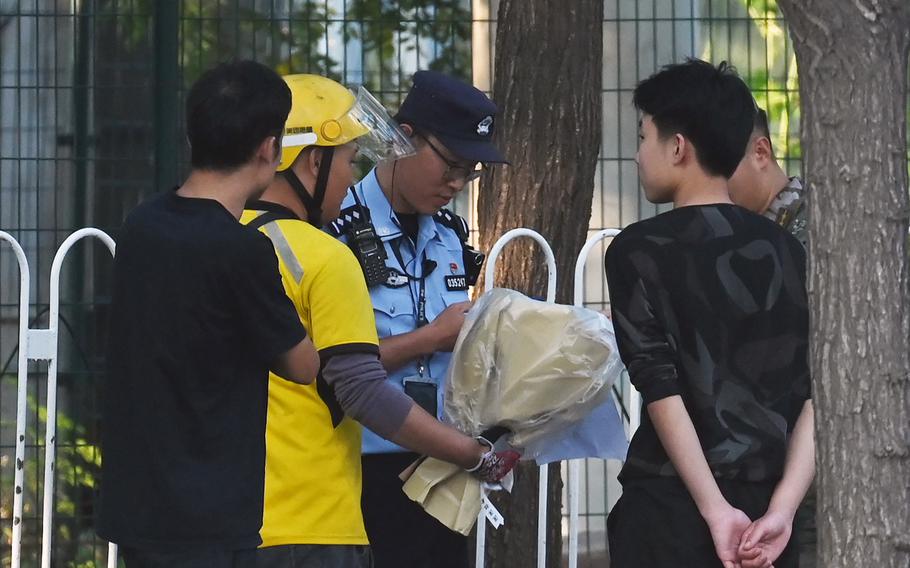
Police and security check a delivery rider (second left) who arrived with what appeared to be a bouquet of flowers at the entrance of the Japanese embassy in Beijing on Sept.19, 2024. China on September 19 expressed “regret and sadness” after a Japanese schoolboy who was stabbed in the southern city of Shenzhen died of his injuries. (Greg Baker/AFP/Getty Images/TNS)
(Tribune News Service) — A 10-year-old Japanese child who was stabbed in southern China has died, a development that could further strain relations between the two countries.
On Thursday morning Japan’s Foreign Minister Yoko Kamikawa confirmed the death of the child, adding that the government was asking China to provide details of what happened and do its utmost to ensure the safety of Japanese citizens.
“We understand that the attacker is in custody, and his motivations will become clearer following interrogation,” Kamikawa told reporters. “This sort of incident shouldn’t happen in any country.”
The student was stabbed in Shenzhen on his way to school on Wednesday. Japanese media reported that the boy was with his mother and was attacked about 200 meters from the Shenzhen Japanese School.
The Japanese government formally protested the attack, and the Chinese ambassador was summoned in Tokyo on Wednesday afternoon, according to a statement from the Japanese Ministry of Foreign Affairs.
Later on Thursday, Prime Minister Fumio Kishida expressed his condolences over the boy’s death and repeated the request that China provide more information.
“We will keep strongly requesting that Chinese authorities explain the facts of the situation,” he said in a post on X. “It’s now been more than a day since the crime, and I have given instructions to strongly request an explanation as soon as possible,” he said, adding that Japan insists that China protect the lives of Japanese citizens and work to ensure there was no repetition of this kind of crime.
Japan’s top government spokesman Yoshimasa Hayashi refrained from commenting on the incident’s potential impact on the two countries’ relationship Thursday, but echoed foreign minister Kamikawa by condemning “the despicable act of attacking a child.”
The incident added to a series of assaults on foreigners in China in recent months, and was at least the second to target Japanese nationals in China. In June, a Japanese woman and her child were attacked with a knife in the eastern city of Suzhou. A Chinese bus attendant was killed in that incident.
Japan’s government is still waiting for the authorities in Suzhou to provide a detailed explanation of that attack, with the consulate in nearby Shanghai saying they continue to request information from the city.
On Wednesday official media in China mostly carried a terse statement from Ministry of Foreign Affairs spokesman Lin Jian about the case, offering few details. Reports on the stabbing case by some outlets including Caixin and ifeng.com had been censored by Thursday morning.
On Thursday Lin said that the government was saddened by the incident and expressed its condolences to the family. He refused to answer repeated questions on the motive of the attacker, but said that this attack and the previous one in Suzhou were “individual cases.” According to Lin, the boy was a Japanese citizen with a Japanese father and a Chinese mother.
The boy’s death Thursday is likely to further damage ties between the two neighbors, which have been strained due to historical resentments, an ongoing territorial dispute, and other issues including China’s reaction to Japan releasing wastewater from a destroyed nuclear power plant. Wednesday marked the anniversary of the 1931 Mukden Incident, which was the beginning of Japan’s invasion of Manchuria.
As if to underline those rising tensions, a Chinese aircraft carrier passed between two Japanese islands early on Wednesday morning, prompting Japan to lodge a protest with the Chinese ambassador. The Japanese protest also referred to “a series of recent actions” by China, likely a reference to a Chinese airforce plane which breached Japanese airspace last month, and the subsequent entry of a Chinese naval vessel into Japan’s territorial waters.
Japanese companies were already becoming much more hesitant about the Chinese market, with the slowing economy adding to the tense geopolitical relationship. Rising concerns about their personal safety will only add to those headwinds.
The number of Japanese living in China has fallen in recent years. In 2022, the last year for which data is available, there was around 102,000 Japanese registered as living in China according to official statistics. That was down a third from the recent peak in 2012.
In 2022 China’s borders were still closed, pushing down the number of foreigners living in the country. After the reopening in 2023 there has been an increase in foreigners traveling to and living in the country, but concerns about personal safety may affect that trend.
Isabel Reynolds, Jing Li and Dan Murtaugh contributed to this report.
©2024 Bloomberg LP
Visit bloomberg.com.
Distributed by Tribune Content Agency, LLC